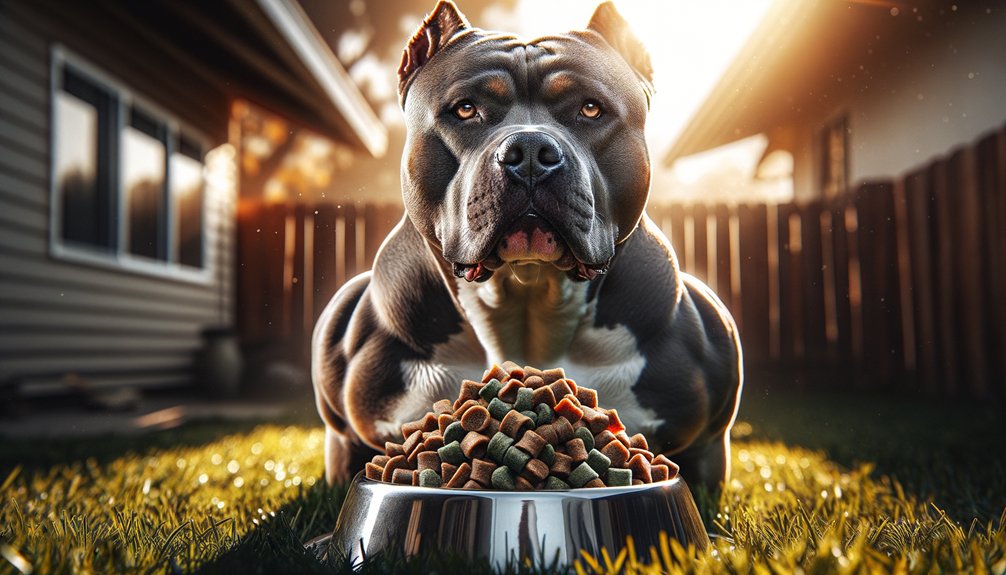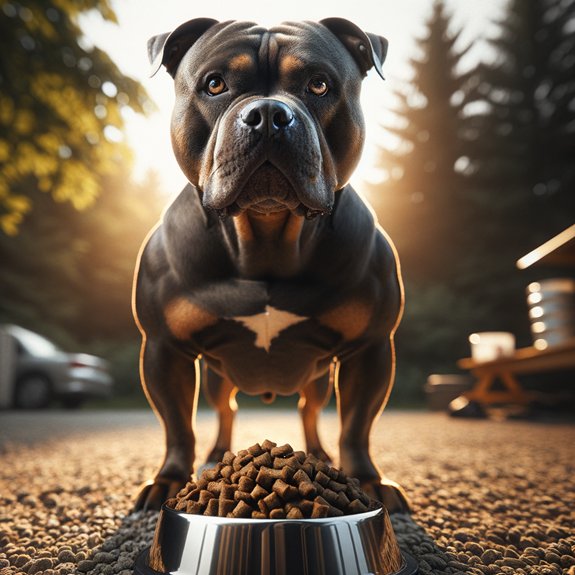The Best Fluffy Pancakes recipe you will fall in love with. Full of tips and tricks to help you make the best pancakes.

When we watch a pitbull power through a sprint like a finely tuned athlete, we’re really seeing protein metabolism in action. These dogs burn through amino acids quickly, so their diet can’t be an afterthought. High protein food supports lean muscle, joint stability, recovery, and even immune resilience—but not all “high protein” formulas are equal, and too much can strain the body. Understanding that balance is where our choices start to matter. Supercharge your pitbull’s athletic power and protect their health with high protein dog food—but only if you know the crucial balance their body truly needs.
Key Takeaways
- Supports pitbulls’ naturally muscular, athletic build
- Aids faster recovery from exercise or injury
- Helps maintain steadier energy between meals, reducing fatigue and performance dips in active dogs.
- Promotes healthier skin, a denser coat, and stronger nails through adequate structural proteins.
- When using quality, named animal proteins and balanced formulas, high protein is safe for most pitbulls with normal kidney and liver function.

Understanding Protein Needs in Pitbulls
Why do pitbulls so often benefit from higher protein diets compared with some other breeds? When we’re understanding protein for this breed, we start with their physiology. Pitbull metabolism tends to support a higher lean body mass and an athletic build, even in family companions. That means they turn amino acids over quickly and require consistent dietary replenishment.
With high protein feeding, we’re not chasing trends; we’re matching intake to tissue demand. Adequate essential amino acids support muscle synthesis, tendon and ligament repair, immune function, and enzyme activity. If we undersupply protein, the body catabolizes existing muscle to meet basic needs. lience, and functional capacity across their lifespan.
Key Benefits of High Protein Diets for Pitbulls
A well-formulated high protein diet offers several measurable advantages for pitbulls, especially given their naturally muscular, high-activity physiology. When we prioritize optimal protein sources and thoughtful feeding frequency, we support performance, resilience, and long-term health in the dogs we serve.
- Enhanced lean muscle mass and strength, with better power output during work or play
- Improved tissue repair and recovery after intense exercise, injury, or surgery
- More stable energy curves between meals, reducing fatigue and promoting consistent engagement
- Support for immune function through adequate amino acids for antibodies and repair enzymes
- Healthier skin, denser coat, and stronger nails, reflecting sufficient structural proteins

How to Choose a Quality High Protein Dog Food
Selecting a high protein dog food for pitbulls starts with verifying that the protein content and quality align with your dog’s physiology and activity level, not just with marketing claims on the bag. We first look for clearly named animal proteins (chicken, beef, turkey, fish) as the primary ingredients and an AAFCO statement confirming the diet is complete and balanced for our dog’s life stage.
We then examine the guaranteed analysis, targeting at least 25–30% protein on a dry matter basis for active pitbulls. We stay alert to high protein myths, recognizing that healthy kidneys tolerate appropriate protein levels. We also evaluate grain free concerns, choosing formulations that include wholesome grains when appropriate, unless a veterinarian confirms a specific grain sensitivity.
Potential Risks and Signs of Too Much Protein
Occasionally, a well-meaning effort to “power up” a pitbull’s diet overshoots the mark, and excessive protein can begin to stress the body instead of supporting it. When we serve guardians and their dogs, we must weigh the potential risks alongside the benefits.
Clinically, chronic protein excess may burden kidneys, alter liver workload, and disturb gut microbiota. We watch closely for early signs of too much protein so we can intervene before damage occurs.
Key red flags include:
- Strong ammonia-like urine odor or increased thirst
- Soft stool, diarrhea, or excessive gas
- Unexplained weight gain or loss despite stable calories
- Restlessness, reduced exercise tolerance, or muscle stiffness
- Elevated kidney or liver values on veterinary bloodwork
Sample Feeding Guidelines and Transition Tips
Successfully feeding a high protein diet to a pitbull begins with clear portion targets and a calm, structured shift. We align portions with body weight, body condition score, and activity, then adjust every 1–2 weeks. Most adults do well with a twice-daily feeding schedule to stabilize glucose and support lean mass.
We can use these transition guidelines to protect gut health:
| Day Range | Old Food | New High-Protein Food |
|---|---|---|
| 1–3 | 75% | 25% |
| 4–6 | 50% | 50% |
| 7–10 | 25% | 75% |
We observe stool quality, gas, pruritus, and energy. If stools soften or the dog seems uncomfortable, we pause progression or step back one phase before continuing the transition.
Frequently Asked Questions
Can High Protein Dog Food Help Manage My Pitbull’s Allergies or Skin Issues?
Yes, we can sometimes support allergy management and skin health with high protein diets, but we need to identify specific allergens, prioritize novel or hydrolyzed proteins, ensure balanced omega‑3s, and collaborate closely with a veterinarian or veterinary dermatologist.
How Does High Protein Food Affect Pitbull Puppies Versus Senior Pitbulls?
High protein food supports controlled puppy growth, building lean muscle and bone, while for seniors it preserves muscle mass despite slower senior metabolism. We pair protein with balanced calories, joint support, and veterinary monitoring to sustain lifelong strength and comfort.
Are There Breed-Specific High Protein Formulas Designed Especially for Pitbulls?
Yes, we do see “Pitbull-specific” foods, but evidence doesn’t support unique formulas based on Pitbull genetics. Instead, we should prioritize balanced high-protein diets with proven protein stability, digestibility, and joint, cardiac, and skin support for optimal service-focused care.
Can I Feed High Protein Dog Food to a Pregnant or Nursing Pitbull?
Yes, we can feed high protein dog food to pregnant pitbulls and nursing pitbulls, provided it’s a complete, balanced, growth‑oriented formula; we should consult a veterinarian to tailor calories, calcium, and monitoring.
How Does Exercise Level Influence Ideal Protein Sources for Pitbulls?
Exercise level determines whether we prioritize lean animal proteins and adjust protein timing around activity. When exercise requirements rise, we’d guide you toward highly digestible proteins, spaced meals, and post‑exercise feeding to optimize muscle repair and long‑term health.
Conclusion
When we choose high‑protein food for our pitbulls, we’re not indulging a fad; we’re performing basic biology. Muscles require amino acids, not marketing slogans. named animal proteins, AAFCO-balanced formulas, and monitoring body condition and labs, we support lean mass, joint stability, immune resilience, and recovery—rather than “bulking” them for Instagram. If we treat protein like a calibrated therapy instead of a personality trait, our dogs get health, not hype.









